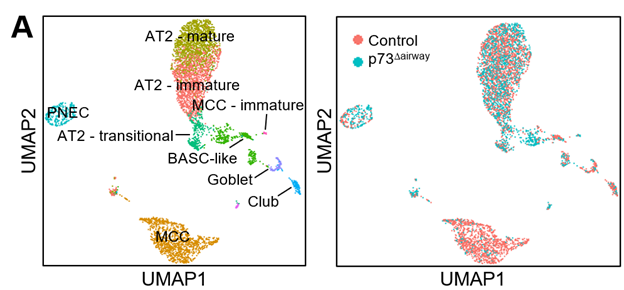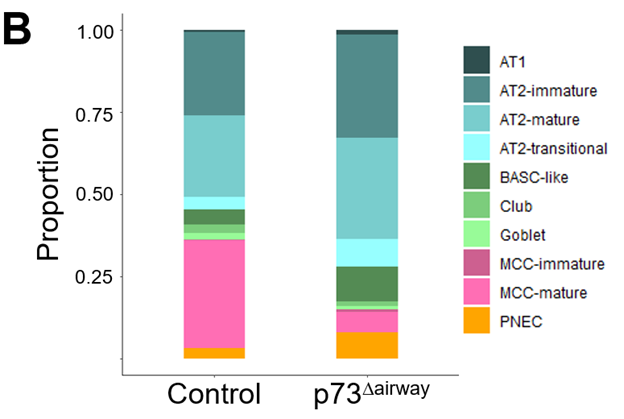Loss of p73 Expression Contributes to Chronic Obstructive Pulmonary Disease
p73 is a transcription factor required for ciliated cell differentiation. To better understand if loss of ciliated cells contributes to lung pathology in chronic obstructive pulmonary disease (COPD) we generated mice lacking p73 in the respiratory epithelium.
The resulting p73Δairway mice were analyzed using electron microscopy, flow cytometry, morphometry, forced oscillation technique, and single-cell RNA sequencing. The effects of cigarette smoke on p73 transcript and protein expression were examined using in vitro and in vivo models and in studies including airway epithelium from smokers and COPD patients.
We found loss of functional p73 in the respiratory epithelium resulted in a near-complete absence of MCCs in p73Δairway mice (Figures A and B).


In adulthood, these mice spontaneously develop neutrophilic inflammation and emphysema-like lung remodeling and had progressive loss of secretory cells despite enrichment of pathways related to cell-cell and cell-basement membrane attachment. Exposure of normal airway epithelium cells to cigarette smoke rapidly and durably suppressed p73 expression in vitro and in vivo and TP73/p73 was reduced in human airways of current compared to former smokers and former smokers with COPD compared to non-COPD controls.
Together, these studies suggest loss of functional p73 in murine airway epithelium results in the absence of MCCs and promotes COPD-like lung pathology. In smokers and patients with COPD, loss of p73 may contribute to MCC loss or dysfunction.
| Sample Name | Genotype |
|---|---|
| Control (pooled from 6 mice) | Shh.Cre-/Flox-p73 |
| p73Δairway (pooled from 6 mice) | Shh.Cre+/Flox-p73 |
For more information, refer to this recent publication:
Loss of p73 Expression Contributes to Chronic Obstructive Pulmonary Disease

"Evercode provides superior data quality to other methods we’ve tested."
We're your partners in single cell
Reach out for a quote or for help planning your next experiment.